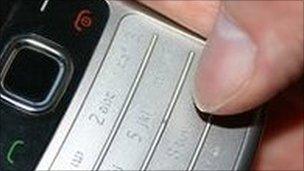Watchdog to speed up access to Motorman information
- Published

The use of private investigators has been central to allegations of phone hacking
Efforts to inform people whether they were illegally targeted by private investigators will be speeded up, the Information Commissioner has said.
Christopher Graham said he would "fast-track" inquiries relating to Operation Motorman - a 2003 investigation into the trade in confidential information such as phone numbers and addresses.
Mr Graham said there were 4,000 names in files obtained during its probe.
Anyone concerned they might be included should contact the watchdog, he said.
Investigators recovered evidence of the illegal accessing of private data in a raid on the Hampshire home of the private investigator Steve Whittamore in March 2003.
2003 investigation
It included criminal record checks, ex-directory telephone numbers, mobile phone numbers and vehicle registration checks.
MPs on the Home Affairs Select Committee are examining the case for statutory controls on private investigators in the wake of the phone hacking scandal.
Appearing before the cross-party committee, Mr Graham said there were "4,000 surnames" listed in folders held by Mr Whittamore - detailing requests for information from him made by newspapers and magazine journalists.
Asked by MPs what the watchdog had done to notify people who might be listed, he said there were no addresses included and it was "not clear" who many of the 4,000 people were.
To contact each of these individuals - which some MPs and campaigners have called for - would be "a monumental task" and "fanciful" given the watchdog's resources.
Since 2003, people have been able to request access to the information under data protection laws but MPs and privacy campaigners have said the process is too bureaucratic and takes too long.
'Hue and cry'
But, in response to what he said was a "hue and cry" over the issue, Mr Graham said the system would be "fast-tracked" so that members of the public could now simply e-mail requests for notification.
"If you are not in the files, we can tell you straight away," he told MPs. "If we say 'there is a name that looks a bit like you, could be' we will help you to make a subject access request and we will investigate that."
"We will as quickly as we can give you a yes or no answer. In most cases, it will be no. If you have the slightest scintilla of information your name may be in the file, we will help...you get the details."
The committee was told that Whittamore, who was convicted of illegally accessing data in 2005, was "back in business".
Representatives from professional bodies said Whittamore was not registered with them and they questioned the description of him as a private investigator.
"In reality he was an information broker and those were the services that he provided," said Ian Withers, from the World Association of Professional Investigators.
The involvement of private investigators in alleged phone hacking are currently being investigated by police while the use of private investigators by newspapers is under scrutiny at the Leveson inquiry into press standards.
A senior Metropolitan Police officer said he believed the role of private investigators - more than half of whom are estimated to be former policemen - posed an "increasing threat" to law enforcement in terms of the risk of corruption.
'Warm words'
Asked whether he had evidence police officers had taken money from private investigators for information, he said "there was intelligence but proving it is a different matter".
But he added: "We have more evidence about inappropriate relationships with journalists than we do with private investigators."
Serving Met officers were banned from also acting as private investigators, he added. While individual forces drew up their own regulations, it was "highly unlikely" such a situation would be approved anywhere.
Mr Graham said there had been "relatively few" complaints from the public about the activities of private investigators although the watchdog was concerned about what a "number were up to".
However, he said efforts to tighten the rules on self-regulation since the watchdog drew attention to the issue in 2006 had amounted to "warm words" and more progress was needed.
"It would help us in our work and would give greater confidence to the public at large if there was a comprehensive framework of regulation of private investigators," he said.
"It would greatly aid the work of the information commissioner if there were others labouring in this particular vineyard."
- Published9 December 2011
- Published5 December 2011